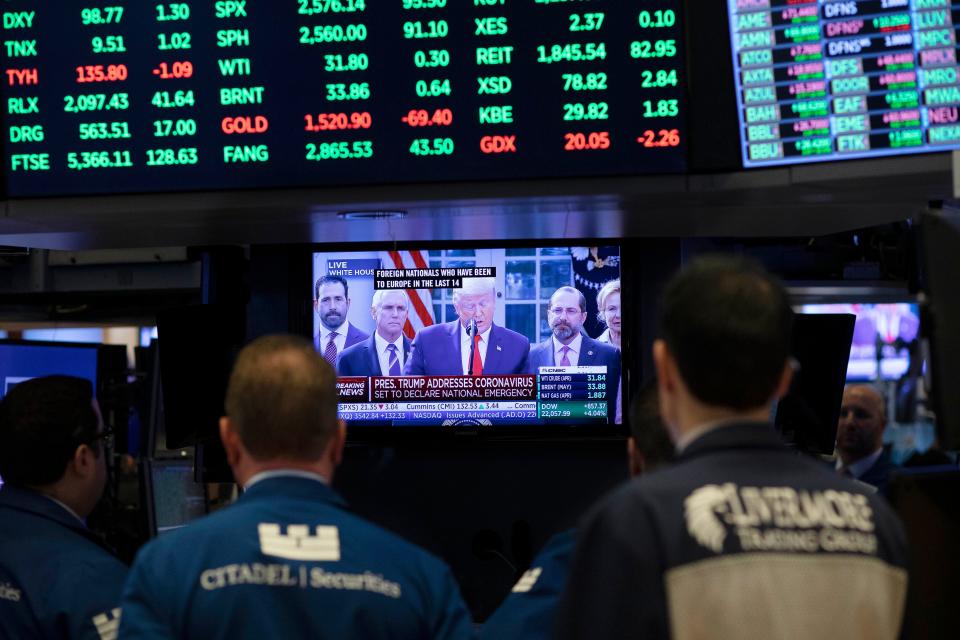Stocks stabilize as investors brace for another volatile week
U.S. stocks rose Monday, propelled by gains in health care stocks, as investors braced for another volatile week following a surge of infections from the deadly coronavirus pandemic.
The Dow Jones industrial average climbed 690.70 points, or 3.2%, to close at 22,327.48 after the blue-chip average notched its best week since 1938. The Standard & Poor’s 500 advanced 3.4%
Shares of Dow component Johnson & Johnson jumped 8% after the health care conglomerate said human testing of its experimental vaccine for the coronavirus will begin by September, and it could be available for emergency use in early 2021.
Traders say that stocks could get another boost over the coming days as money managers rebalance their portfolios toward stocks into the end of the quarter. But analysts caution that the recent rally could fade if coronavirus infections continue to climb.
“There was an unbelievable amount of uncertainty when this whole crisis started,” says Don Townswick, director of equity strategies, portfolio management at Conning. “There was really no clarity on how this would impact companies' earnings. As time goes by, we’ve seen an increasing number of infections but there’s been a reduction in a nightmare scenario amid help from fiscal stimulus.”
What we know: How the $2T coronavirus stimulus will affect you and the economy
Contact your mortgage lender: Payments may be deferred as coronavirus pandemic causes worker hardships

Investors will monitor employment data and manufacturing gauges this week for further indications on how the pandemic has affected the U.S. economy. The damage from the virus to corporate profits, the ultimate driver of stock prices, remains uncertain.
“Last week's rally was driven by the relief that governments and central banks had put in place measures to support businesses and the unemployed,” Adrian Lowcock, head of personal investing at investment platform Willis Owen, said in a note. “This week the challenge is far greater, as investors consider how to respond amid a likely uptick in bad news flow as the virus escalates and the economic outlook gets worse.”
Stock futures slumped late Sunday after President Donald Trump extended the national social distancing guidelines to April 30 as the U.S. death total surpassed 2,800 people. There were more than 153,000 confirmed cases Monday, according to the Johns Hopkins University data dashboard.
The announcement came after Trump said last week he hoped to open up the country by Easter. Anthony Fauci, director of the National Institute of Allergy and Infectious Diseases, projected between 100,000 and 200,000 people could die from the virus. The global death count was more than 36,800 Monday, and there were more than 766,000 confirmed cases.
Analysts and traders say that investors are looking for the number of infections to slow before markets can find a bottom.
“Stocks will likely trade in a narrow trading range unless this situation gets significantly better or worse,” says Joe Conroy, founder of Maryland-based Harford Retirement Planners. “If we start to see the infection numbers top out, we could see a bottoming process in the stock market.”
Energy stocks slumped Monday as oil prices hit an 18-year low. Shares of Occidental Petroleum and ConocoPhillips shed 5% and 5%, respectively.
Benchmark U.S. crude fell 6.6% to close at $20.09 a barrel. Earlier, it dipped below $20 for the first time since early 2002. Oil started the year above $60, and prices have plunged on expectations that a weakened global economy will consume less fuel. The world is awash in oil, meanwhile, as producers continue to pull more of it out of the ground. Brent crude, the international standard, fell 8.7% to $22.76 a barrel.
In a sign of increased caution, the yield on the 10-year Treasury fell to 0.64% from 0.74% late Friday.
In Europe, Germany’s DAX rose 1.9% while the CAC 40 in Paris added 0.6%. Britain’s FTSE 100 climbed 1%. Tokyo’s Nikkei 225 lost 1.6%, while the Shanghai Composite shed 0.9%. The Hang Seng in Hong Kong fell 1.3%.
Contributing: The Associated Press
This article originally appeared on USA TODAY: Dow: Stocks stabilize as investors brace for volatile week
